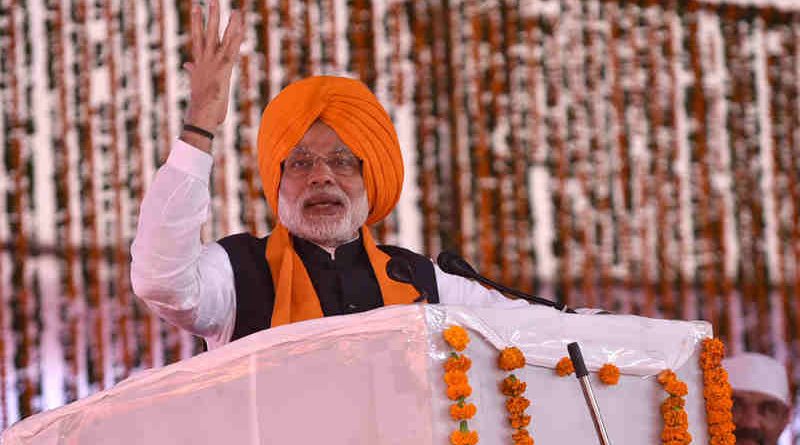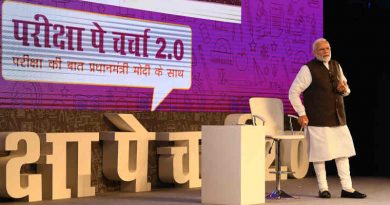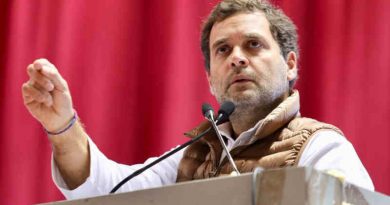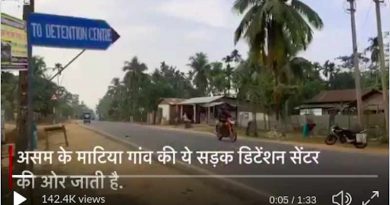Corruption and Hindu Terror Increasing in India: 2017 World Report

Now it is being observed that India has become a kakistocracy where the government is under the control of the worst, least qualified, and most unscrupulous people. ~ Rakesh Raman
India maintains a robust electoral democracy. However, politics (and business) are beset by corruption. The constitution guarantees freedom of expression and the news media are vibrant, even as speech and reportage deemed seditious or harmful to religious sentiment is routinely censored and punished.
These are among the findings of a new “Freedom in the World 2017” report released by Freedom House, a Washington-based independent watchdog organization dedicated to the expansion of freedom around the world.
The report observes that vigilante cow-protection groups associated with nationalist Hindu organizations are engaged in a number of assaults on Dalits and Muslims and Prime Minister Narendra Modi has been criticized for failing to promptly condemn the attacks.
Moreover, the arrest of student protesters in Delhi on sedition charges raised concerns about freedom of expression on university campuses.
The report also mentions about the Goods and Services Tax and demonetization policy that the Modi government introduced with the aim to reduce corruption.
Rampant Political and Bureaucratic Corruption
However, the report reveals that political corruption has a negative effect on government efficiency and economic performance.
“Though politicians and civil servants at all levels are regularly caught accepting bribes or engaging in other corrupt behavior, a great deal of corruption goes unnoticed and unpunished. This is particularly the case in the energy and construction sectors, and in state infrastructure projects more broadly,” the report said among its findings.
The Lokpal and Lokayuktas Act, which the president signed in 2014, creates independent government bodies tasked with receiving complaints of corruption against public servants or politicians, investigating claims, and pursuing convictions through the courts.
Modi and members of his government have signaled support for the law, but two years on, there is little evidence that it is being effectively implemented, the report said.
It further states that the 2005 Right to Information (RTI) Act is widely used in India to improve transparency and expose corrupt activities, though there are questions about its enforcement.
Since the enactment of the RTI Act, according to the report, at least 56 right-to-information users and activists have been murdered, and more than 311 have been assaulted or harassed.
The report also states that Modi is a controversial figure given his role as chief minister during the 2002 Gujarat riots, an outbreak of communal violence in which more than 1,000 Muslims were killed, and in which he has been accused of complicity.
Threats to Freedom of Expression
Meanwhile, the report finds that threats to freedom of expression—including intimidation of and attacks against journalists and users of online social media—continued. There is increasing concern about the harassment of bloggers and social-media users by Hindu nationalists.
The private media are vigorous and diverse, and investigations and scrutiny of politicians are common. Nevertheless, revelations of close relationships between politicians, business executives, and lobbyists and some leading media personalities and owners of media outlets have dented public confidence in the press, the report stated.
According to the report, a prominent television station declined to air an interview with a major opposition-party politician and former finance minister, apparently because he had been critical of the Modi government’s “surgical strikes” on Pakistani targets across the Line of Control (LOC) demarcating the Indian- and Pakistani-held parts of Kashmir.
Separately, in July, three Chinese journalists were denied visa renewals by the Indian government and expelled from the country; a Chinese state-owned newspaper suggested that this was punishment for China’s objection to India joining the Nuclear Suppliers Group.
Journalists risk harassment and sometimes, physical violence. In 2016, at least two journalists were killed in connection with their work, and three others were killed under circumstances where the motive remained unclear, according to the Committee to Protect Journalists. According to the report, there is increasing concern about harassment of bloggers and social-media users by Hindu nationalists.
Internet access is largely unrestricted, though officials periodically implement overly broad blocks on supposedly offensive content to prevent communal or political unrest.
The 2000 Information Technology Act criminalizes the sending of offensive messages by computer, and this has been interpreted to allow for censorship of critical commentary on political parties and specific politicians.
The authorities have also used security laws, criminal defamation legislation, hate-speech laws, and contempt-of-court charges to curb critical voices on both social media and traditional media platforms.
Hindu Terror
Hindus make up about 80 percent of the population. The Indian state is formally secular. Freedom of religion is constitutionally guaranteed and generally respected in practice.
However, according to the report, legislation in several Hindu-majority states criminalizes religious conversions that take place as a result of “force” or “allurement,” which can be broadly interpreted to prosecute proselytizers. Some states require government permission for conversion.
An array of Hindu nationalist organizations and some local media outlets promote antiminority views, a practice that critics charge is tolerated or even encouraged by the Hindu nationalist government of Prime Minister Modi.
Like the year before it, 2016 saw a series of attacks on minorities tied to the alleged slaughter or mishandling of cows (animals held to be sacred by Hindus).
Ruling-party politicians have called for the release of those charged with the lynching of a Muslim man in 2015, demanding instead that the victim’s family be prosecuted for cow slaughter.
Self-styled gau rakshaks (cow protectors) have engaged in vigilante violence against Dalit communities in Gujarat and Karnataka. The report says Modi has been criticized for failing to promptly condemn the perpetrators of such attacks.
Academic freedom is generally robust, though intimidation of professors, students, and institutions over political and religious issues has been increasing.
In February 2016, Kanhaiya Kumar, a student leader at Jawaharlal Nehru University in New Delhi, was remanded in custody on charges of sedition for having led protests on the anniversary of the 2013 execution of Mohammad Afzal Guru, who had been convicted of involvement in a 2001 terrorist attack on the parliament.
The arrest sparked a wave of protests, intensified by a video apparently showing Kumar being beaten en route to court. At least two more students were later accused of sedition over involvement with the protest, but were released on bail after turning themselves in.
Separately, according to the report, a professor at the University of Mysore was arrested in June 2016 for a speech the previous year that allegedly insulted a Hindu deity. The events have had a chilling effect among Indian intellectuals.
Human Rights Violations
There are some restrictions on freedoms of assembly and association. Section 144 of the criminal procedure code empowers the Indian authorities to restrict free assembly and impose curfews whenever “immediate prevention or speedy remedy” is required. State laws based on this standard are often abused to limit the holding of meetings and assemblies, the report said. Nevertheless, it adds that protest events take place regularly.
According to the report, human rights organizations operate freely, but they continue to face threats, legal harassment, excessive police force, and occasionally lethal violence.
While India is home to a strong civil society sector and academic community, foreign monitors and journalists are at times denied visas to conduct research in the country on human rights and other topics.
Under certain circumstances, the Foreign Contributions Regulation Act (FCRA) permits the federal government to deny nongovernmental organizations (NGOs) access to foreign funding. The government has been accused of abusing this power to target political opponents, the report observed.
In April 2015, the authorities canceled the FCRA licenses of some 9,000 charities for failing to declare details about foreign donations. In June 2016, the Home Affairs ministry withdrew FCRA registration from the Sabrang Trust, an NGO that has advocated for the victims of the 2002 riots in Gujarat.
Although workers in the formal economy regularly exercise their rights to bargain collectively and strike, the Essential Services Maintenance Act has enabled the government to ban certain strikes. The report reveals that tens of millions of public sector workers went on strike countrywide for 24 hours in September 2016 to demand a monthly minimum wage.
Corruption in Judiciary
The judiciary, according to the report, is independent of the executive branch. Judges have displayed considerable activism in response to public-interest litigation matters.
However, the report says the lower levels of the judiciary in particular have been rife with corruption, and most citizens have great difficulty securing justice through the courts.
The system is severely backlogged and understaffed, leading to lengthy pretrial detention for a large number of suspects, many of whom remain in jail longer than the duration of any sentence they might receive if convicted.
Police torture, abuse, and corruption are entrenched in the law enforcement system, the report reveals. Citizens frequently face substantial obstacles, including demands for bribes, and in getting the police to file a First Information Report, which is necessary to trigger an investigation of an alleged crime.
Custodial rape of female detainees continues to be a problem, as does routine abuse of ordinary prisoners, particularly minorities and members of the lower castes.
In the country’s largest state of Uttar Pradesh, the report says 428 deaths occurred in police or judicial custody between October 2015 and September 2016, according to the National Human Rights Commission (NHRC).
The NHRC is headed by a retired Supreme Court judge and handles roughly 8,000 complaints each year. While it monitors abuses, initiates investigations, makes independent assessments, and conducts training sessions for the police and others, its recommendations are often not implemented and it has few enforcement powers.
The commission also lacks jurisdiction over the armed forces, one of the principal agents of abuse in several parts of the country, the report says. The NHRC nevertheless makes a contribution to accountability by submitting reports to international bodies such as the UN Human Rights Council, often contradicting the government’s account of its own performance.
Crimes by Security Forces
According to the report, security forces operating in the context of regional insurgencies continue to be implicated in extrajudicial killings, rape, torture, arbitrary detention, kidnappings, and destruction of homes.
The criminal procedure code requires that the government approve the prosecution of security force members; approval is rarely granted, leading to impunity. The Armed Forces Special Powers Act grants security forces broad authority to arrest, detain, and use force against suspects in restive areas; civil society organizations and multiple UN human rights bodies have called for the act to be repealed. A number of other security laws allow detention without charge or based on vaguely worded offenses, the report stated.
In India’s seven northeastern states, according to the report, more than 40 insurgent factions—seeking either greater autonomy or complete independence for their ethnic or tribal groups—continue to attack security forces and engage in intertribal violence.
The report says the criminal justice system fails to provide equal protection to marginalized groups. Muslims, who make up about 14 percent of the population, are underrepresented in the security forces as well as in the foreign and intelligence services.
In parts of the country, particularly in rural areas, informal community councils issue edicts concerning social customs. Their decisions sometimes result in violence or persecution aimed at those perceived to have transgressed social norms, especially women and members of the lower castes.
Dalit Discrimination
The constitution bars discrimination based on caste, and laws set aside quotas in education and government jobs for historically underprivileged scheduled tribes, Dalits, and groups categorized by the government as “other backward classes.”
However, according to the report, members of the lower castes and minorities continue to face routine discrimination and violence. Many Dalits are denied access to land and other public amenities, are abused by landlords and police, and work in miserable conditions.
The penal code forbids “intercourse against the order of nature.” Discrimination against LGBT (lesbian, gay, bisexual, and transgender) people continues, including violence and harassment in some cases, though the Supreme Court recognized transgender people as a third gender in 2014.
In June 2016, according to the report, the Indian government opted to abstain on a vote at the UN Human Rights Council in which a resolution was being passed to establish a special office for addressing LGBT discrimination worldwide.
The report also finds that rape, harassment, and other transgressions against women are serious problems, and lower-caste and tribal women are particularly vulnerable.
Mass demonstrations after the fatal gang rape of a woman on a Delhi bus in 2012 prompted the government to enact significant legal reforms. However, egregious new cases emerged in 2016, including the July gang rape of a mother and 14-year-old daughter in Uttar Pradesh, leading to calls for further action.
Despite criminalization and hundreds of convictions each year, dowry demands persist. A 2006 law banned dowry-related harassment, widened the definition of domestic violence to include emotional or verbal abuse, and criminalized spousal rape. However, reports indicate that enforcement is poor. According to the report, statistics suggest that murders and suicides associated with dowry disputes are on the rise in parts of the country.
According to Freedom House, the numerical ratings and status in its India report do not reflect conditions in Indian-controlled Kashmir, which is examined in a separate report.





